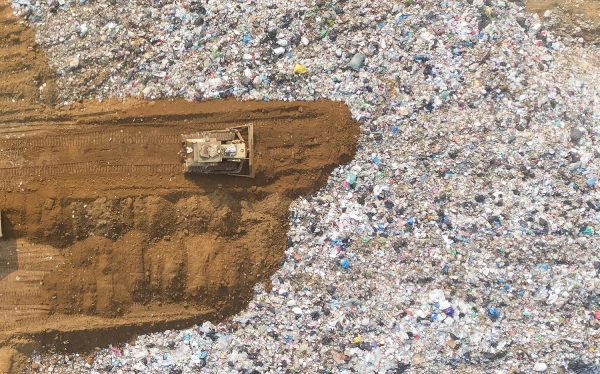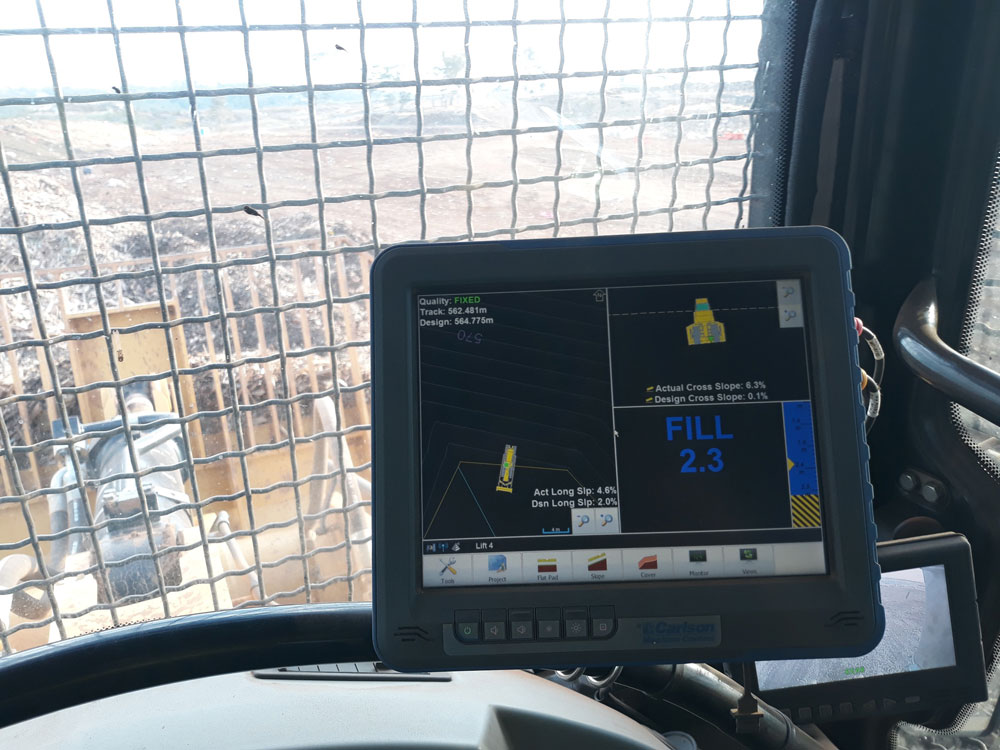As the population grows, so too does the demand for waste management facilities. The pressure is on our industry to ensure landfill management is as efficient and productive as possible, maximising every potential to save on space, time, and resources. Accurate and optimised compaction is critical to delivering on these goals.
Are you using GPS to manage your compaction?
Poor compaction exposes a landfill site to numerous risks, including inefficient airspace use, greater settlement, and shortened cell life, all leading to lost time and money. Relying solely on an operator’s experience, no matter how skilled they are, is simply not accurate enough to ensure these risks are adequately managed.
Introducing GPS-based machine guidance is a simple and effective way to empower operators with the information they need to work accurately to the landfill design. Solutions such as the LandfillGrade system from Carlson, can be installed on any age, make or model of machine. The kit includes a GPS antenna mounted to the roof, along with sensors fitted to the body, and an in-cab display that give the operator a clear, visual representation of their position and distance to grade.

How can our GPS Landfill compactor project?
Airspace Optimisation and longer cell life
The costliest aspect of running a landfill over time is daily waste placement activities. GPS machine guidance enables operators and managers to use every cubic metre of space as efficiently as possible, optimising airspace whilst saving on machine wear and fuel usage.
Exactly how much compaction can be increased depends on numerous factors, with some operators reporting a 5% increase over a year whilst others can see a dramatic 20% jump in as little as three months. The question is, if you are relying on operator experience and eyesight alone, how will you know if compaction is as good as it could be?
To track the benefits further, a dollar amount can be applied to each cubic metre of airspace so that the results of implementing machine guidance can be measured in cost savings. In a United States landfill, management organised a site survey of a cell that was thought to be full, only to realise that with GPS machine guidance they could reclaim a further $100,000 of airspace!
By optimising airspace, accurate compaction also extends the life of the cell. Not only is the cell not filled before its projected date, but an existing cell life can be extended to delay the time, costs and environmental impact of creating a new cell.

Increasing safety and minimising environmental impact
In addition to the cost benefits, landfill managers have an environmental and safety responsibility as well. Fewer air pockets where methane gas can build up and lead to combustion helps to reduce waste gas production and associated dangers to staff on site.
Stormwater management and leachate reduction are also critical health and environmental factors. GPS machine guidance fitted to landfill compactors enables operators to work accurately to design and eliminate the dips and voids that allow stormwater to seep in and pool to create leachate.
With an optimised cell design that includes adequate slopes for runoff to be managed effectively, GPS machine guidance enables operators to ensure the material is always compacted to grade.
Effective leachate management has cost upside in addition to environmental and safety benefits, as reduced leachate production saves on treatment costs that can add up quickly.
Hitting targets and tracking results
Without accurate data and reporting from GPS landfill compactor, there is no way of knowing if operators are meeting daily compaction targets. Intermittent checks and surveys, depending on their regularity, may delay identifying issues as they occur and lead to significant rework and additional expense.
Systems such as Carlson’s LandfillGrade from Aptella help to dramatically reduce or eliminate rework because operators, managers and engineers have live information available throughout their working day. With the ability to measure results on an ongoing basis, GPS machine guidance helps to keep compaction targets on track.
And with all parties – engineer, landfill manager, operators – working to the same plan with the same information, GPS machine guidance keeps all key stakeholders up to date and able to measure results.
What if you don’t have the time to transition to new systems?
At Aptella, we recognise that adapting to new systems and technology can be daunting, particularly when you have a small team and are wary of disruption. Our team is experienced in making the transition as easy as possible for your team, getting everything setup, tested, and validated before training operators and management. We also offer full data management and reporting services so that you can get the reports you need delivered to your inbox without having to learn another system and run them yourself.
For more information, please contact Aptella on 1300 867 266 or visit www.aptella.com

We source, deploy and support intelligent positioning solutions to enhance our customers’ productivity.
Aptella Pty Ltd
ABN 56 130 367 065
2024 Aptella Pty Ltd | ABN 56 130 367 065 | Terms and Conditions | Privacy Policy